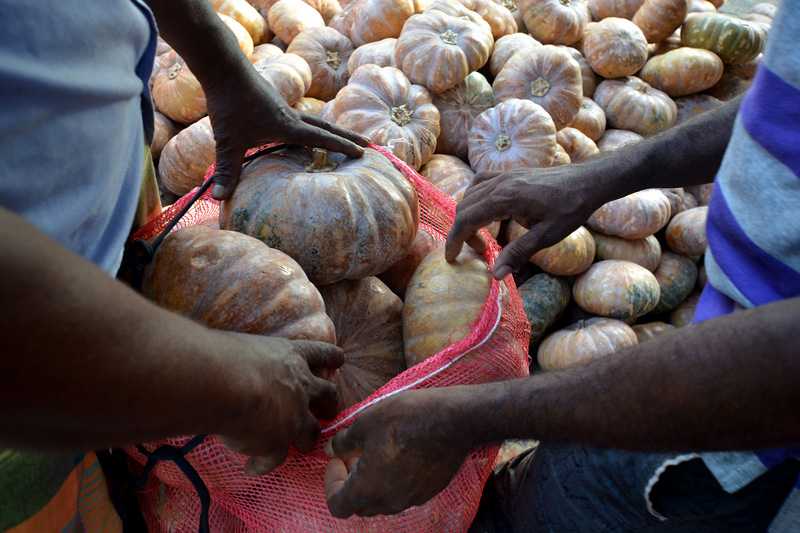Monday Jan 19, 2026
Monday Jan 19, 2026
Wednesday, 5 May 2021 00:00 - - {{hitsCtrl.values.hits}}

The Cabinet Paper banning fertiliser, pesticide, and weedicide imports is rather unusual. The entire justification for the proposed actions is anchored on the President’s election manifesto. No references are provided to studies, committee reports, etc. It is foolhardy to build national policy on the weak foundation of manifesto promises – Pic by Shehan Gunasekara
 The Cabinet Paper banning fertiliser, pesticide, and weedicide imports with immediate effect that was rubber-stamped last week without discussion constitutes a sea change in Sri Lanka’s agriculture policy. Its implications for consumers, for the livelihoods of farmers, and for those who have invested in agriculture and related sectors are vast.
The Cabinet Paper banning fertiliser, pesticide, and weedicide imports with immediate effect that was rubber-stamped last week without discussion constitutes a sea change in Sri Lanka’s agriculture policy. Its implications for consumers, for the livelihoods of farmers, and for those who have invested in agriculture and related sectors are vast.
Despite the 20th Amendment, it is wrong to marginalise Parliament and to ignore State agencies with expertise. Because agriculture is a devolved subject, officials in the Provincial Councils should be consulted even in the absence of elected Council members. Given the expropriatory effects on the private property of those whose investments are affected, the authority of the Courts as the guardians of fundamental rights and as the upholders of equity is likely to be invoked.
No mandate for change
The Cabinet Paper is rather unusual. The entire justification for the proposed actions is anchored on the President’s election manifesto. No references are provided to studies, committee reports, etc.
It is foolhardy to build national policy on the weak foundation of manifesto promises. Each manifesto contains a multiplicity of promises. Was the vote a considered approval for each of those promises?
The primary purpose of a manifesto is to convince citizens to vote for the candidate or political party presenting it. The secondary purpose is to gain legitimacy for specific actions. Manifesto making is political not scientific or systematic.
Those who have been involved in manifesto making will testify to the opacity of the process, wherein what is accepted one day can disappear the next and new clauses and conditions can mysteriously appear even after “finalisation”.
Contributions can be sought, and consultations conducted, but in the end, decisions are made by a few in proverbial “smoke-filled rooms.” A manifesto is, at most, broadly indicative of orientation and priority-setting. Given the partisan and opaque procedure used to develop a manifesto, errors and impossible promises are unavoidable.
But because the Cabinet Paper lacks any other justification, one must look. Rather than rely solely on the quoted excerpts, I went to the source. The proposed actions are inconsistent with the language of the manifesto.
In order to guarantee the people’s right to such safe food, the entire Sri Lankan agriculture will be promoted to use organic fertilisers during the next 10 years. For this, production of organic fertiliser will be accelerated.
The language is anchored on food safety. But the ban affects fertilisers and chemicals used for all crops, not just what is consumed by citizens. There is a commitment to provide inorganic fertiliser free. The transition is to take place over a decade. These actions are to be taken in the context of “a new national agricultural policy would be introduced after an in-depth review of the present policies.” This promise is prefaced by a condemnation of “policy that changes from one season to another”.
No national policy based on review of existing policies and experience; no assessment of the experience of other countries; a policy that changes things in one week not a season. And most importantly, the telescoping of a 10-year process into a few months. Sudden, not gradual. Instead of free inorganic fertiliser, a ban. Not limited to traditional villages but across the board. The proposed bans lack a mandate.
 Procedurally flawed
Procedurally flawed
A change in a policy with broad impact requires care and caution.
The change may do much good, as the Cabinet Paper claims. Because of the repeated claims that our food is contaminated with “vasa visa,” most consumers would support a change away from chemical fertiliser and pesticides. But they are unlikely to accept higher prices and unavailability. Hotels are unlikely to accept “ugly fruit”. Growers are unlikely to accept drastically reduced yields and/or inability to market their produce at prices that are above costs of production. The net benefit must be demonstrated, not simply asserted.
Growers large and small will be unhappy about being unable to recover the investments they have made in preparations for growing or in crops in the ground by this sudden reversal in policy. This response will also be shared by other participants in the sector who had entered perfectly legal contracts but are now unable to clear their shipments from the port. It is common sense for the government to give adequate notice of a change in policy or the law so that affected parties can make the necessary adjustments to their business practices minimising losses.
Policy changes that can do good, can also do harm. It is customary in policy formulation and implementation to look at relevant cases in other countries or in this country. Risk assessment, identification of collateral effects, and careful structuring of rules to avoid negative outcomes can be done by government officials or by external consultants with the required expertise. When the government liberalised the market for international telephony in 2003, we studied prior experiences in countries including Hong Kong (the most liberalised market in Asia) and India (to learn what missteps to avoid).
The President claims that Sri Lanka will be the first to go all-organic. A cursory internet search will show that a fellow SAARC country, Bhutan, announced the intention to go all-organic in 2008; and that its experience has been assessed by independent scholars and published in the peer-reviewed and open scientific publication PLOS ONE in 2018 (DOI =10.1371/journal.pone.0199025). The abstract states:
Organic agriculture (OA) is considered a strategy to make agriculture more sustainable. Bhutan has embraced the ambitious goal of becoming the world’s first 100% organic nation. By analysing recent on-farm data in Bhutan, we found organic crop yields on average to be 24% lower than conventional yields. Based on these yield gaps, we assess the effects of the 100% organic conversion policy by employing an economy-wide computable general equilibrium (CGE) model with detailed representation of Bhutan’s agricultural sector incorporating agroecological zones, crop nutrients, and field operations. Despite a low dependency on agrochemicals from the onset of this initiative, we find a considerable reduction in Bhutan’s GDP, substantial welfare losses, particularly for non-agricultural households, and adverse impacts on food security.
Does this mean that no other country should go all-organic? No. Is this the only study? No. The purpose of looking at the experience of others is to learn from them. It is irresponsible not make the effort to mitigate the negative impacts will fall upon consumers, growers and others in the sector and to design the policy most suited for local conditions.
Even within the country, prior knowledge existed because the fiasco of the previous Government’s effort to promote organic farming at the behest of Ven. Athuraliye Rathana, MP. That ended with much waste of public funds and the shutting down of the implementing agency, SEMA. It would not have been all wasted if the present Government made the effort to learn from it.
The Government appears to have learned little from the palm oil ban that had to be walked back and modified. It is normal procedure to circulate a Cabinet Paper to all relevant Ministries for their input to and to win concurrence. Walking back and modifying is what happens when this procedure is not followed.
This blanket ban does not affect only food items consumed within Sri Lanka. It affects subjects under multiple Ministries. It can devastate non-food segments such as foliage exports. It is likely to strangle the fast-growing fruit and vegetable export industry which was subject to rigorous enforcement of standards such as Euro GAP that my organisation worked on with the Department of Agriculture and the exporters association. The Legislature can choose to take actions that result in such collateral effects. But it should at least have considered them. This Cabinet Paper does not.
What should be done
The Government should suspend the implementation of the Cabinet Paper and appoint an inter-Ministry committee of experts with the power to co-opt external experts to report back on a practical method of achieving the objectives of ensuring food safety and environmental conservation. Given the complexity of the changes and the collateral effects, it is best that a pilot be conducted. The larger program design should be based on those learnings.
If the Government does not act responsibly, the Opposition should demand a select committee, or at least a debate in Parliament. Stakeholders should move the courts. Our food and our livelihoods are too important to be cavalierly toyed with by those learning on the job.